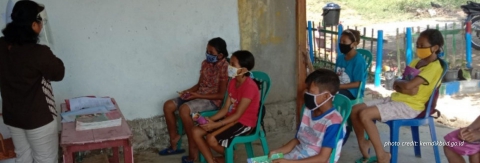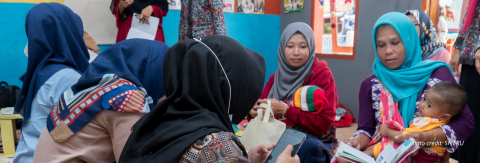The nutrition and maternal and child health (MCH) services in Kabupaten (District of) Gowa have been facing many problems that have hampered efforts to achieve the target of these services even before the coronavirus disease 2019 (COVID-19) pandemic. As a region with the second highest number of COVID-19 cases in South Sulawesi Province, Kabupaten Gowa is facing a new challenge in providing nutrition and MCH services amidst the pandemic.
The SMERU Research Institute, with the support of the Knowledge Sector Initiative (KSI), in the period of February–March 2021 conducted a study to measure the severity of the decline of nutrition and MCH services in Kabupaten Gowa during the COVID-19pandemic. The study primarily employed a qualitative approach, namely in-depth interviews with pregnant women and mothers of newborns and under-fives hereafterwomen; healthcare workers; community figures; health cadres; and health agency staff. To support our qualitative analysis, we used quantitative data compiled from the analysis of routine data on women’s visit to health facilities to use nutrition and MCH services, as well as an online survey.
In a nutshell, the study shows a varied decline in the target achieved for the nutrition and MCH services in Kabupaten Gowa. Temporary delays on the health services of the integrated service post (posyandu1) when the pandemic hit the country led to the biggest decline in the achievement of the targets set for the services, namely weighing and basic immunizations for children under five years of age. Factors that discourage women in accessing the nutrition and MCH services during the pandemic are fear of getting infected with the coronavirus and financial issues because of the decline in their income during the pandemic.
Based on the study’s findings, we developed three policy briefs to represent the types of services: (i) pregnancy care services; (ii) childbirth and postpartum care services for women and newborn babies; and (iii) health services for children under five years of age. In general, the recommendations in these policy briefs are directed at improving the effort to educate women and their families by using a more personal approach. The use of information and communication technology through the Safe Communication with Midwives (Komandan2) program can also be maximized to reach more targeted participants, especially during the pandemic. Moreover, local community figures need to play a greater role in fostering an environment that supports mothers who need to access nutrition and MCH services at health facilities from pregnancy until the child reaches the age of five.




